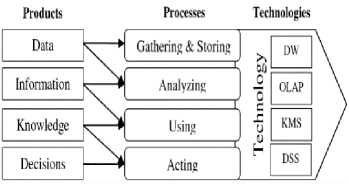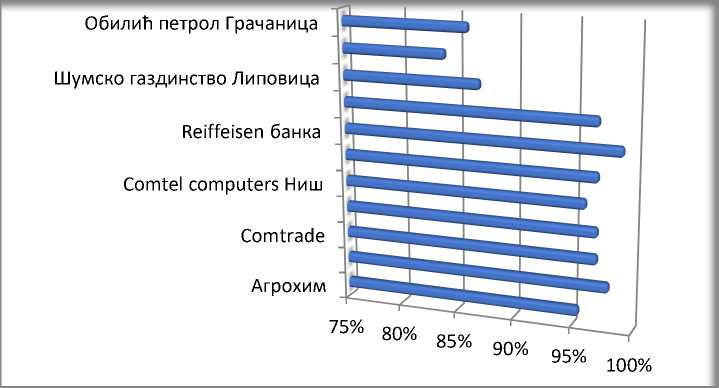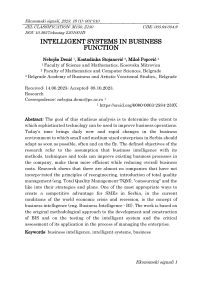Intelligent systems in business function
Автор: Denić Nebojša, Stojanović Kostadinka, Popović Miloš
Журнал: Ekonomski signali @esignali
Статья в выпуске: 1 vol.18, 2023 года.
Бесплатный доступ
The goal of this studious analysis is to determine the extent to which sophisticated technology can be used to improve business operations. Today's time brings daily new and rapid changes in the business environment to which small and medium-sized enterprises in Serbia should adapt as soon as possible, often and on the fly. The defined objectives of the research refer to the assumption that business intelligence with its methods, techniques and tools can improve existing business processes in the company, make them more efficient while reducing overall business costs. Research shows that there are almost no companies that have not incorporated the principles of reengineering, introduction of total quality management (eng. Total Quality Management-TQM), "outsourcing" and the like into their strategies and plans. One of the most appropriate ways to create a competitive advantage for SMEs in Serbia, in the current conditions of the world economic crisis and recession, is the concept of business intelligence (eng. Business Intelligence - BI). The work is based on the original methodological approach to the development and construction of BIS and on the testing of the intelligent system and the critical assessment of its application in the process of managing the enterprise.
Business intelligence, intelligent systems, business
Короткий адрес: https://sciup.org/170204010
IDR: 170204010 | УДК: 005.94:004.9 | DOI: 10.5937/ekosing2301001D
Текст научной статьи Intelligent systems in business function
-
1. Introduction
In today's complex business conditions due to the current world economic crisis, recession, and the process of business globalization, companies in Serbia, in order to survive in an increasingly open market, are forced to change and adapt and to continuously monitor current changes and business trends. The economy and technology are developing exponentially, and this requires companies and entre-preneurs to change faster, to be different, better and more successful (Cavalcanti E.P. 2005), everything becomes dependent on the availability of information and investment in innovation and new technologies, in not only technical-technological but also business development. (Denic et al. 2023). SMEs in Serbia operate in an extremely uncertain and changeable bu-siness environment with an extremely high degree of uncertainty and the impossibility of predicting the future. (Djelosevic, Spa-sojevic 2021)
-
2. Subject and problem of research
-
3. The aim of research with hypotheses
The latest research shows that employers in Serbia usually fight the crisis by laying off workers and freezing salaries. Almost half of the respondents (49%) stated that their company had already laid off workers, while 48% of them stated that 2
The subject of research in this work can essentially be divided into a theoretical and a practical part. In the theoretical part of the paper, the concepts, terms, functions and methods of business decision-making, BI and BIS (eng. Business Intelligence systems - BI) are explained. In the practical part, the results of research in companies in Serbia are presented. In our environment, this topic has not gained importance. It is emphasized a lot, research has not been carried out on this topic to a sufficient and necessary extent. There is not much information or data about the importance and impact on business intelligence for business. In this sense, there is no clear picture of the subject area in the environment where the scientific research work was carried out.
One of the primary research goals of this work is the analysis of business intelligence and business intelligence systems, which will fully satisfy the needs of SMEs in Serbia for business information and propose a different approach to developing BIS and building its own decision support solutions. In this direction, the request was made that the intelligent system thus formed should be simple enough for use by key users and managers in the decisionmaking process. The goal of the research paper is an attempt to qualitatively analyze the advantages and effects of applying modern sophisticated software tools for SMEs in Serbia. In addition, the paper aims to investigate the variability of the displayed techno-logies in different specific environ-mental conditions and application situations in companies. The main hypothesis in the paper is: Business intelligence affects the improve-ment of the business of SMEs in Serbia, forming a positive attitude about the effects of the application of the development of business intelligence methods and tools in the company.
The well-known expert Joros points to the problem of processing business data, and in his research states that the primary source of business information for SMEs is very broad and includes: manufacturers, customers, business associations, government officials, radio and television, libraries, newspapers, magazines, government publications, trade and professional and electronic sources (Joros B. N., 2014). However, according to this author, the latest research results indicate that 72% of companies and business systems estimate that half of the information that is collected and stored expensively and for a long time will never be used when making decisions, and that only about 5 to 7% of the information manages to use it in the purpose of their business. In this sense, by adopting the concept of BI and managing business information, the company can use the remaining data collected from numerous sources, turning it into quality information using the BI system (Turban et al, 2008). The introduction of BIS in a company implies the choice of a certain strategy, and as a rule it represents a large separate job that requires a project approach (Sommer D., 2008).
The three most important factors that make managers decide to use BIS are: improving business planning, monitoring key business indicators and reporting to top management (Denić et al, 2014). Research also indicates that for SMEs from various economic acti-vities, there are recommendations and the most common practices for using BIS. However, regardless of this, there are certain common characteristics, typical of successful BIS projects. In the initial phase of BIS establishment, it is necessary to transfer the separate initiative or request for BIS to other business functions or departments in the SME. It is very important to avoid the demotivation of employees in SMEs during the BIS introduction project, because there is fear and uncertainty about possible organizational changes and changes in the performance of daily business activities. (Fatić V. 2019) The next picture (Figure 1) shows the BI process.

Figure 1 . Business Intelligence process [Shollo, A., & Kautz, K. (2010)]
In the reference provides scientific literature and based on experience from practice, the following advantages that BIS provided to SMEs can generally be stated as:
-
- Improvements in the SME management process;
-
- Planning, control, measurement and implementation of changes that lead to an increase in income and a decrease in company costs.
-
4. Research results
-
5. Conclusion
The initial research assumption that business intelligence affects the operations of companies was confirmed in the operations of the investigated companies, and the management of the companies: "Si-monida-Gračanica", "Obilić-Petrol" Lipovica, PUK Regional Waterworks and Sewerage, and the Urban Institute showed an extremely positive position on the effects of the application of the development of intelligent decision support systems in the company. By using the advantages provided by the techni-ques: ETL, OLAP, DM, DW, and business intelligence with their dynamic applications, an excellent interaction with the end user is enabled. Taking into account all the previously mentioned aspects of the creation and use of intelligent information sys- tems, it is concluded that intelligent information systems undoubtedly affect the company's operations. The graphic representation in the following image (Graphic 2) presents the results of conducted research and surveys on SMEs in Serbia, which unequivocally confirms the hypothesis. The diagram shows the results of a survey conducted in SMEs in Serbia, different in type of activity, ownership and organizati- onal structure, on a representative

Figure 2. Improvement ofbusiness by application ofbusiness intelligence [N. Denić 2015]
sample, in order to confirm the hypothesis that business intelligence affects the improvement of the business of SMEs in Serbia, forming a positive attitude on the effects of the application of development methods techniques and tools of business intelligence in the enterprise.
In this paper, systematic research has proven that the development of intelligent systems for decision support in companies: improves the process of business decision-making, enables more efficient management and realizes the comptitive advantage of the company. This work provides answers to the challenges faced by SMEs in Serbia, in whose operations large amounts of data are generated, which, together with external data sources, represent the basis for making appropriate business decisions. The research results of this work fill the gap in the field of economic and socio-tec-hnical research on the development of intelligent decision support sys- tems in the function of improving the business of SMEs. It relies on the connection of decision theory, business intelligence, intelligent systems and project management, where new original, unique models of the development of intelligent decision support systems are presented. The basic research concept of the dissertation is guided by the idea that by synthesizing modern IT methods and techniques: ETL, OLAP, DW and Data Mining through the practical application of business intelligence concepts, tools and techniques, a new high-quality information system for SMEs can be developed, which improves work at the operational level, and it primarily facilitates top management to make correct business decisions important for the survival and development of SMEs in Serbia. The results of studious research indicate that the biggest contribution to the efficiency of the company is a quick insight into a large amount of data and shortening the time of accessing information. Analysis of PIS reports provides the opportunity to develop the pattern, effectiveness and efficiency of business operations with the possibility of timely influence and intervention on the business processes of SMEs and business improvement.
Список литературы Intelligent systems in business function
- Ahmad, A., Ahmad, R. & Hashim, K. F. 2016. ‘Innovation Traits for Business Intelligence Successful Deployment’. Journal of Theoretical & Applied Information Technology, Vol.89, No. 1, pp.96-107.
- Cavalcanti E.P., The Relationship between Business Intelligence and Business Success, Journal of Competitive Intelligence and Management., Vol.3, No.1,p.3- 11. 2005.
- Denić, N., Radević, B., i Siljković, B., The role of digital marketing in promotion of wine from Kosovo and Metohija,
- Ekonomika poljoprivrede 2018, 65 (3),1071-1083,doi:10.5937/ekoPolj1803071D,UDC663.2:004. 738.5 (497. 115)https://scindeksclanci.ceon.rs/data/pdf/0352-3462/2018/035234621803071D.pdf
- Denić, N., Nešić, Z., Ilić, I. et al. Adaptive neuro fuzzy estimation of the most influential speckle noise distributions in color images for denoising performance prediction. Multimed Tools Appl(2023).https://doi.org/10.1007/s11042-023-14633-5
- Denić, N., Moračanin, V., Milić, M., i Nešić Z., (2014), Risk Management in Information System Projects, Tehnicki Vjesnik-Technical Gazette, (2014), vol. 21 br. 6, ISSN 1330-3651 (Print), ISSN 1848-6339 (Online), str. 1239-1242., UDC/UDK658.51.001.3:004.451 (IF 0,579for 2022),https://pdfs.semanticscholar.org/e296/bdeb45d1529063da938bf6182e2cf02ba946.pdf
- Denić, N., Vujović, V., Stevanović,V., i Spasić, B., (2016), ”KEY FACTORS SUCCESSFUL IMPLEMENTATION OF ERP SYSTEMS” ”The journal Tehnički Vjesnik/Technical Gazette, ISSN 1330-3651, Vol. 23./No. 5,OCTOBER 2016,(str.13351341)DOI:10.17559/TV20150618213311.https://doi.org/10.17559/TV-20150618213311
- Fatić Vasilije Internet inteligentnih uređaja u maloprodaji Ekonomski signali: poslovni magazine vol. 14, br. 2, str. 49 - 64, 2019UDK: 658.87:004.738.5007:004]:339 Irani Z., Love P. E. D., The Propagation of Technology Management Taxonomies for Evaluating Investments in Information Systems, Journal of Management Information Systems, Vol. 17., No. 3, pp. 161-177.2000.157
- Joros B. N., Information needs and information seeking behaviors of SME managers and Botswana, The Libri, 56, 97-107. http://www.librijournalorg/pdf/2006-2pp97-107.pdf (Pristup sajtu 10.08.2022).
- Shollo, A., & Kautz, K. (2010). Towards an Understanding of Business Intelligence.
- Sommer D., Spending and Sourcing Preferences for Business Intelligence and Information Infrastructure, Fiscal 2009, Gartner Inc. Research, 3. juli 2008, http://www.gartner.com/Display Document? (Pristup sajtu 15.06.2022)
- Turban E., Leidner D., Mclean E., Wetherbe J.,Information Technology for Management (6th Ed.), New Jersey: Wiley. 2008.314
- Javno komunalno preduzeće Regionalni vodovod i kanalizacija., www.javno-komunalno-preduzece-regionalni-vodovod-ikanalizacija.ls.rs (Pristup sajtu 26.04.2014).
- Đelošević Ivana, Spasojević Branka, The Importance of Communication for Business Success of Companies in the Conditions of Globalization, Ekonomski signali: poslovni magazin 2021, vol.
- , iss. 2, pp. 1-10, DOI: 10.5937/ekonsig2102001D
- Wanda, P., & Stian, S. (2015). The Secret of my Success: An exploratory study of Business Intelligencemanagement in the Norwegian Industry. Procedia Computer Science, 64, 240–247. doi:10.1016/j.procs.2015.08.486
- Yeoh, W., & Popovič, A. (2016).Extending the understanding of critical success factors for implementing business intelligence systems. Journal of the Association for Information Science and Technology,67(1), 134–147. doi:10.1002/asi.23366


